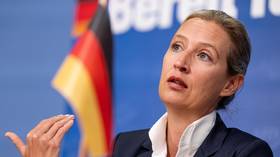‘We have arrived’ – Germany’s far-right AfD

Alice Weidel, co-leader of Germany’s far-right Alternative for Deutschland (AfD), said on Monday that the results of recent state elections show that the party has “arrived” as a mainstream political force in the EU country after winning its highest-ever share of the vote in a western German state.
“AfD is no longer an eastern phenomenon, but has become a major all-German party,” Weidel said on Monday. “So we have arrived.” She added that the “disdain and contempt” for the AfD from the political establishment in Germany “won’t be tenable in the long run.”
Formerly considered to be a party more attractive to voters in the post-communist east, the anti-immigration AfD won 18.4% of the vote on Sunday in the state of Hesse in western-central Germany – an area that includes the financial capital, Frankfurt. The party finished second behind the Christian Democratic Union (CDU), and third in Bavaria. Around one-quarter of all eligible German voters live in Hesse.
It was the best result for the AfD in a western state election in the party’s ten-year history.
The campaign leading to Sunday’s vote, which came at the halfway point of Chancellor Olaf Scholz’s unpopular coalition government, was dominated by concerns about immigration. In Bavaria, 83% of voters aligned themselves with parties pledging adjustments to the country’s immigration and asylum policies. Some 21% of Bavarians said immigration was the most important political issue in Germany, compared to 18% in Hesse, polling indicated.
The three parties of the center-left ruling government – Scholz’s Social Democrats, the Greens and the FDP – were sharply rebuked by voters in Hesse and Bavaria, with the FDP failing to achieve the necessary votes to get into parliament in Bavaria.
“The huge alienation between the governing parties in Berlin and the many normal working people” is the primary factor behind the growth of Germany’s far-right, Manfred Gullner of the Forsa polling institute said following the election results, according to The Guardian.
Markus Soder, leader of the Christian Social Union – the dominant political force in Bavaria for decades – said the results of the vote should send an “alarm signal” through Berlin’s corridors of power.
“The topic of migration is a purely federal issue, not a regional policy issue,” Soder said, adding that in order to respond to the AfD’s rise, Berlin must “change Germany’s migration policy.”
The number of migrants to Germany was greater in 2022 than ever before, German federal statistics firm Destatis said in June. Around 2.67 million people arrived in the country that year, while just 1.2 million departed, leaving a net gain of 1.46 million people. The primary cause for the increase in migration was the conflict in Ukraine, which led to approximately 1.1 million Ukrainian refugees seeking safety in the EU state.














